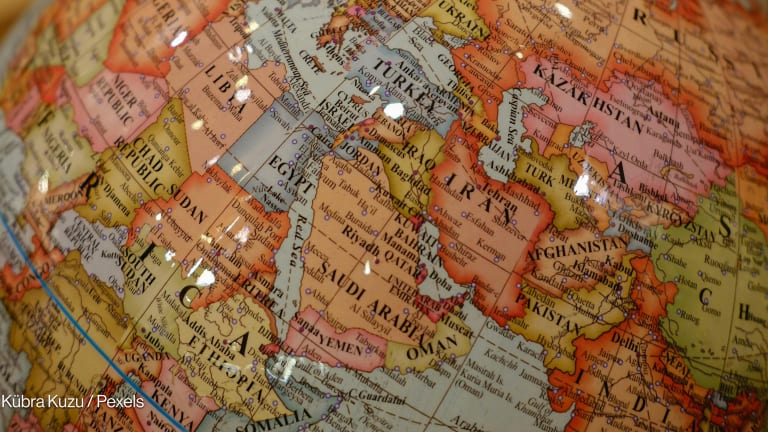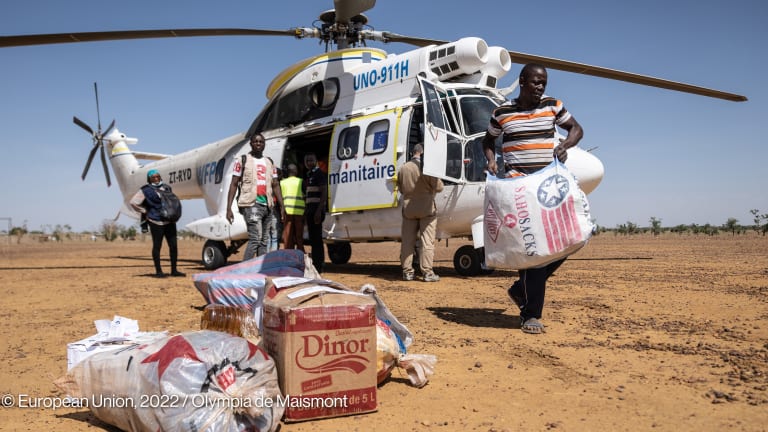
WASHINGTON — In the wake of the U.S. strike in Baghdad that targeted and killed Iranian Gen. Qassem Soleimani, international aid groups operating in Iraq and throughout the Middle East fear they could face backlash against Western influence in the region and lose their ability to access the communities in which they currently implement programs.
“We are preparing across the Middle East for more chaos, more conflict, more civilian casualties, and also the now not very remote prospect of Western countries being driven out of the Middle East,” David Miliband, president of the International Rescue Committee, said in an interview on PBS’ Firing Line on Saturday.
“Another confrontation among international and regional powers would be deadly for aid lifelines on the brink of collapse.”
— Jan Egeland, secretary-general, Norwegian Refugee Council“That’s obviously been the strategic goal of Iran for a long time, and that’s been brought closer by the votes in the Iraqi Parliament and by the rising tension about American presence in Iraq,” Miliband said.
On Jan. 5, the Iraqi Parliament voted to expel U.S. troops from the country, prompting President Donald Trump to threaten sanctions and demands for reimbursement.
Devex spoke to aid workers who described being caught off guard — in some cases, asleep — by Iran’s retaliation against U.S. military targets on Jan. 8. After the strikes, they faced security restrictions and a growing sense of alarm about what the clash would mean for Western organizations that rely on acceptance by local communities and permissions from the Iraqi government to access vulnerable communities throughout the country.
"We are increasingly restricted in our movements in and around Anbar and Tikrit, because we were getting word that some of the checkpoints were not secure. So we put a halt on some of [our] transportation,” an aid worker, who requested anonymity for security reasons, told Devex.
The aid worker said that NGOs operating in Iraq are currently cooperating to assess which parts of the country are accessible to their staff and which are not.
U.S. Agency for International Development programs continue to operate in Iraq, according to an agency spokesperson.
"USAID staff and implementing partners remain in the country. We will not discuss specific numbers and locations of staff or activities. Security for all USAID programs is under constant review," the spokesperson said.
Atif Ismail, Oxfam’s deputy country director for Iraq, was sleeping when Iranian missiles began firing on an air base used by U.S troops in Erbil, Iraq, in the early morning hours of Jan. 8. He was alerted to the attack by colleagues, who told him to turn on the TV. Some other staff members who were closer to the base heard the explosions as they occurred.
That morning, Oxfam employees in the country were told to stay home, though they resumed fieldwork the next day. The organization has identified parts of the country that staff should avoid, given their proximity to potential targets. That has prevented Oxfam from reaching some particularly vulnerable communities, including internally displaced people and refugees, Ismail said.
Two American staff members were given the option to relocate outside of Iraq, but both chose to remain in the country, he said.
Ismail said this is the first time in his five-year posting in Iraq that he remembers staff members being told to stay at home for security reasons. While they have dealt with issues related to registration and obtaining visas for international employees, now the organization is dealing with more acute problems of access and movement, with little information about where another attack might happen or how long these tensions will persist.
Humanitarian efforts in Iraq focus on assisting internally displaced Iraqis who fled the Islamic State group and on helping Syrian refugees, including nearly 20,000 — mostly Kurds — who were forced across the border by Turkey’s incursion into the country in October.
The U.S. government has placed a particular emphasis on assisting religious minorities in Iraq and Syria and has begun to transition toward longer-term goals such as recovery and private investment. U.S. officials described those efforts as an attempt to address some of the same grievances that have driven hundreds of thousands of Iraqis into the streets to protest their government, prompting a violent backlash from security forces.
Aid groups operating in the region had already seen geopolitical tensions restrict their ability to serve populations in need before this latest phase of the crisis.
“Another confrontation among international and regional powers would be deadly for aid lifelines on the brink of collapse,” said Jan Egeland, secretary-general of the Norwegian Refugee Council, in a statement.
Egeland noted that sanctions have “severely affected” NRC’s humanitarian work for Afghan refugees living in Iran, due to the difficulty of finding Western banks willing to transfer funds to those populations.
“It is already too difficult and dangerous for our field relief workers to serve vulnerable communities in the Middle East. On behalf of the millions in need that have nothing to do with the political conflict, we urge de-escalation of this confrontation and direct talks among diplomats to find solutions. Do not make a difficult situation impossible,” he wrote.
Devex Reporter Jenny Lei Ravelo contributed to this article.








